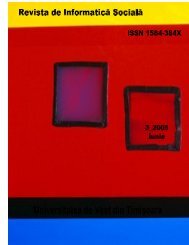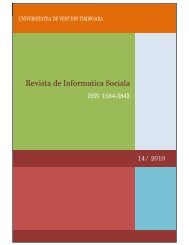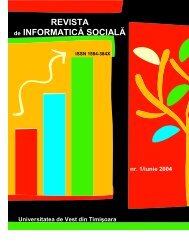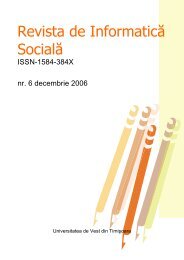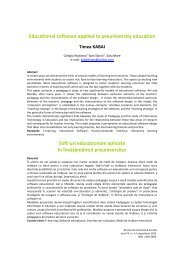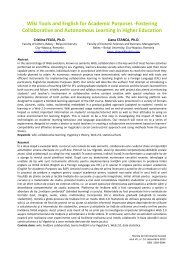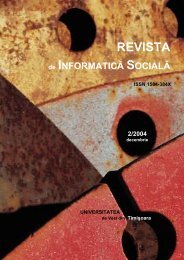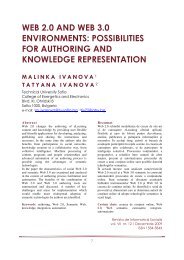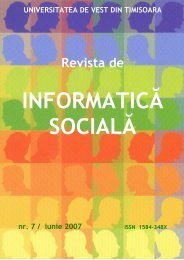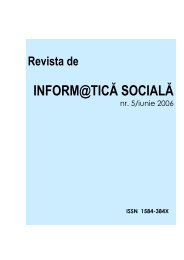No 13 - Journal of Social Informatics / Revista de Informatica Sociala
No 13 - Journal of Social Informatics / Revista de Informatica Sociala
No 13 - Journal of Social Informatics / Revista de Informatica Sociala
You also want an ePaper? Increase the reach of your titles
YUMPU automatically turns print PDFs into web optimized ePapers that Google loves.
communication, <strong>de</strong>layed asynchronous messages, primary content features and user driven "pull"<br />
capacities which all contribute more to the centrifugal complexity <strong>of</strong> the Net than to its centripetal<br />
integration. Thus, Twitter may survive and expand because there are so many followers looking out<br />
for guidance about what is important in the RealWorld and in the Net, and because there are so<br />
many lea<strong>de</strong>rs eager to acquire the most influential status to be gained in the Net: the status <strong>of</strong> an<br />
opinion lea<strong>de</strong>r whose Tweets cause thousands or even million <strong>of</strong> followers to direct their attention<br />
toward indicated events, issues, or information sources.<br />
Apart from such functional uses, Twitter may also become significant by giving rise to a<br />
"laconic verbal culture". Certainly, it is likely to catalyze mental reflection ins<strong>of</strong>ar as it forces<br />
everybody to filter drastically what is communicated and to enco<strong>de</strong> thoughts in very short language.<br />
While most other online text channels lose originality and attractivity because the same materials<br />
are simply reshuffled eternally by “copy and paste”, the world <strong>of</strong> Tweets is a separate sphere <strong>of</strong><br />
verbal expression: set apart by extreme message length limitations.<br />
“The short messages force publishers to write for the medium,<br />
making tweets far more to-the-point than RSS headlines, scraped from<br />
other media, have been.”<br />
(Niles 2009)<br />
Such conditions may be favorable for the reinforcement or rejuvenation <strong>of</strong> traditional<br />
cultural forms that also rely on scarce means <strong>of</strong> verbal expression: e. g. Haiku poetry, xenies and<br />
epigrams; and we may agree with Andrew Keen that “Both Wittgenstein and Nietzsche might have<br />
been challenged by Twitter's aphoristic culture.” (Keen 2008).<br />
REFERENCES<br />
1. Arthur, C. (2008). How Twitter and Flickr recor<strong>de</strong>d the Mumbai terror attacks. The<br />
Guardian, <strong>No</strong>v. 27 th . http://www.guardian.co.uk/technology/2008/nov/27/mumbai-terrorattacks-twitter-flickr.<br />
2. Baratz, M. (2009) Twitter, YouTube among the new propaganda tools <strong>of</strong> the Battle in Gaza.<br />
VentureBeat. DigitalMedia Jan 5 th . http://venturebeat.com/author/mbaratz/.<br />
3. Bernstein, B. (1964) Elaborated and restricted co<strong>de</strong>s: their social origins and some consequences.<br />
American Anthropologist, 66: 55-69.<br />
4. Breslow, J.M. (2008). Politics, 140 characters <strong>of</strong> text at a time. Politico.com, Oct 3 th .<br />
http://www.politico.com/news/stories/1008/14240.html.<br />
5. Cashmore, P. (2008) Is the Enterprise Ready for Microblogging Tools like Twitter? Mashable Sept.<br />
30. http://mashable.com/2008/09/30/enterprise-microblogging/.<br />
6. Cohen, N. (2008) The Global Sympathetic Audience. The New York Times <strong>No</strong>v. 4.<br />
7. Cunliffe, R. (2009) 10 Ways Twitter Will Change Blog Design in 2009. Mashable Jan 4.<br />
http://mashable.com/2009/01/04/twitter-blog-<strong>de</strong>sign/.<br />
8. Doll, D.C. (2008). Micro-blogging: your call to connect online. O'Dwyer's PR Report Vol. 22, <strong>No</strong>.8:<br />
10.<br />
9. Franke-Ruta, G. (2009) Twitter Stays Afloat. Washington Post Jan 21.<br />
http://voices.washingtonpost.com/44/2009/01/20/twitter_stays_afloat.html?wprss=44.<br />
10. Frommer, D. (2009) Is Shaq Bored with Twitter Already? Silicon Alley Insi<strong>de</strong>r Jan 12.<br />
http://www.alleyinsi<strong>de</strong>r.com/2009/1/is-shaq-bored-with-twitter-already.<br />
11. Geser, H. (1996). Auf <strong>de</strong>m Weg zur "Cyber<strong>de</strong>mocracy"? Die Be<strong>de</strong>utung <strong>de</strong>s Internet für die<br />
öffentliche politische Kommunkation. Zürich1996. http://socio.ch/intcom/t_hgeser00.htm.<br />
pag. 17: <strong>Revista</strong> <strong>de</strong> Informatică <strong>Social</strong>ă | Vol. III (<strong>13</strong>) / 2010 | ISSN 1584-384X



